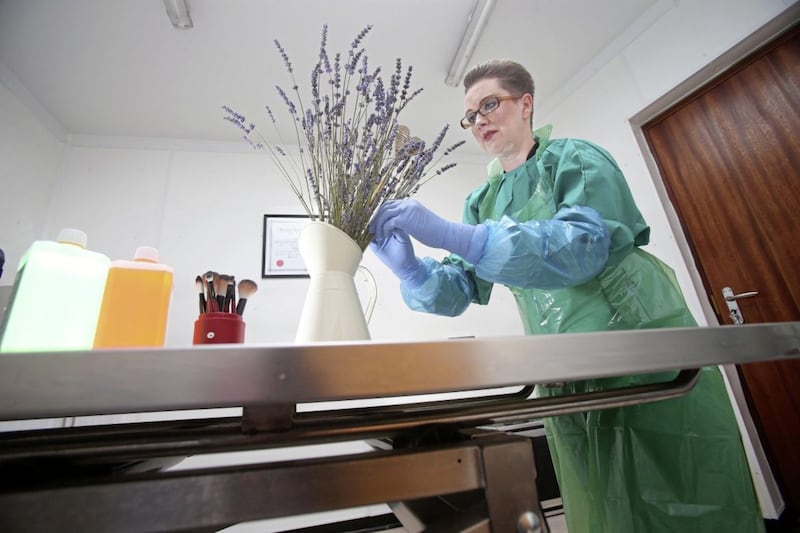'THE eyes of the dead must be gently closed, and the eyes of the living must be gently opened' – these are the words that help motivate Margaret Davis, one of the few female embalmers who work in the north.
"I have this lovely statement written by Jan Brugler on the wall in my prep room, above where I care for people. It's just so nice, and a reminder of what I do," says Margaret, who has been working as a self-employed embalmer for the past eight years.
"Actually, it starts with 'You must express the death of a loved one and then you must go on'. These words tell me about death and how we as people must face up to the fact that someone has passed away and we must get on with life.
"The words about how the eyes are gently closed, well, that relates to me in what I do as an embalmer to ensure that someone is in an acceptable, more presentable and restful state for their loved ones."
The Lisburn wife and mother of two children takes her work very seriously, which at its most usual service, is to preserve the body of a dead person, normally with the use of chemicals, in order for them to be able to be viewed by grieving relatives either during the traditional three-day wake or at a funeral parlour.
This normally takes an average of two hours, and includes washing the deceased person's body and hair, and dressing them, normally in clothes that relatives have chosen, in order to represent their loved one at their very best.
"The embalming I carry out is modern-day embalming, which is caring for the body of a loved one on their passing,” explains Margaret. "This includes the sanitation of the body, chemical preservation of the body and the presentation of the body in the endeavour to create an acceptable and comfortable final memory for family and friends."
However, due to the results of trauma on a deceased person either through accident or after a long, drawn-out illness such as cancer, there can also be a need for the highly skilled reconstructive work, mostly facial, which Margaret specialises in.
To be able to help grieving relatives have the comfort of an open coffin is something that is the ultimate challenge, and honour, for Margaret to undertake at the request of families.
"Achieving an identifiable and acceptable appearance so that family members can view the body is what facial reconstruction is all about and I do it for the positive impact it has on the bereavement process as it helps families confront the reality of their loss," says Margaret.
"I'm firstly involved with the care of the deceased person but I'm also involved in the communication with the family. I believe in very open and honest communication being shared, as sometimes death can be quite a closed subject," she adds.
"I believe that relatives need to know appropriate and adequate information to let them know what is happening to their loved one. Families are actually coming round to this and now want to know what is happening. But it used to be never talked about."

Margaret is a former registered general nurse with 20 years' experience, the last seven of them working in the intensive care ward of the Mater Hospital in north Belfast.
"Those were seven of the happiest years of my life as a nurse," she says. "I was taking part in some CPD [continued professional development] courses when I went to a talk about the history of funeral services. I was deeply interested in it and thought that it would be something that I would like to do should I ever leave nursing."
After gaining certification as an embalmer with a recognised professional organisation, Margaret decided to self-fund advanced training in reconstruction work by training with a specialist embalming academy in Missouri in 2011 and 2014.
While Margaret mostly works with Milne Funeral Services, based in Portadown, Lurgan and Banbridge, she also works with a few other funeral directors throughout the north.
While no working day or working week is ever the same, and it's not the job that many people might be drawn to, Margaret says that it's a job she feels honoured to do.
"It's a very privileged career for me”, she says, "I'm delighted that I can offer families the services I do and I feel very privileged to give people the dignity and respect they deserve for that last journey in life."
"However, in the circumstances of a particularly traumatic death, it would be wrong of me to say that it's not more difficult, particularly where a young person has died. My nursing background comes into play but does anyone be prepared for a situation like that?"
Embalming is not required by law but is known to be the best way to prepare the body in safe conditions for the family to have their loved one home or viewed in a funeral home.
The preparation and the presentation of the deceased has changed over the years, with some families, or the person themselves, asking for cosmetic enhancements to be done on their death, such as work on lips or noses.
Margaret says: "We do get individual special requests. If someone requests something and it's within the sphere of my responsibility and within the level of my skill and knowledge, I will do it to honour the family’s requests. And it's always down to the family, not the funeral director or myself.
"Enhancement services are normally secondary to the need for reconstruction but that's not to say that some services by request are not going on here. Perhaps it will be something that will appeal to people in Northern Ireland more in the future."
:: Margaret Davis MBIE can be contacted by email to margaretdavis4@icloudl.com or mobile 0784 1100 249



